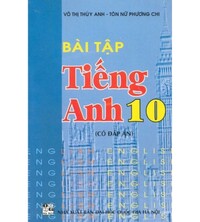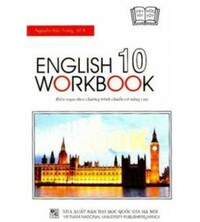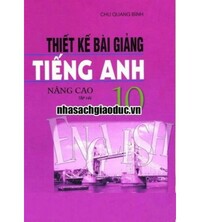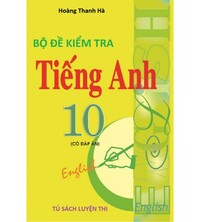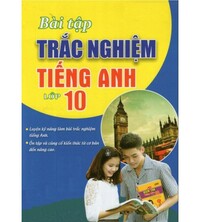Đề thi giữa kì 2 Tiếng Anh 10 Friends Global - Đề số 3
I. Choose the word whose underlined part is pronounced differently. II. Choose the word that has a different stressed syllable from the rest. III. Choose the best option (A, B, C or D) to complete each of the following sentences. IV. Write the correct forms of the words in brackets by adding the correct prefix. V. Read the passage and write the answer True or False.
Đề bài
I. Choose the word whose underlined part is pronounced differently.
1. A. plumber B. uniform C. student D. tutor
2. A. cosmetics B. problem C. offer D. banknote
II. Choose the word that has a different stressed syllable from the rest.
3. A. bargain B. purchase C. promote D. coupon
4. A. politics B. policeman C. currency D. physical
5. A. decision B. determined C. expensive D. applicant
III. Choose the best option (A, B, C or D) to complete each of the following sentences.
6. Don't sit on that bench. I ______________ it.
A. am going to paint B. can paint C. paint D. will paint
7. Be careful or you ______________ fall.
A. will B. are C. are go to D. are going to
8. When you would like to buy or rent a flat or a house, you can come and meet a(n) _________.
A. farm worker B. sales assistant C. estate agent D. delivery man
9. A person who has a lot of imagination and makes new things is ___________.
A. flexible B. creative C. patient D. polite
10. Our shop is always busy. We serve a lot of __________ every day.
A. customers C. jobs C. workers D. applications
11. People go to a _________ if they want to send a letter abroad.
A. post office B. stationer's C. bank D. police station
12. If my brother __________ a journalist, he ___________meet and write about famous people.
A. is - will B. was – can C. were – would D. was - will
13. Mum _________ my homework after I __________ to school.
A. found – went B. founded – went
C. had found – had gone D. found – had gone
14. This month’s __________ include a shirt, trousers and bed covers, and you’re also given a choice of three stores for shopping.
A. discounts B. price tags C. special offers D. refunds
15. She got into __________ when she was a student and she still owes thousands of pounds.
A. budget B. debt C. waste D. income
IV. Write the correct forms of the words in brackets by adding the correct prefix.
16. She still has a good relationship with her _________ in the taking care of their children. (HUSBAND)
17. Don’t __________ your food as this can lower the vitamin and mineral content. (COOK)
18. You have to __________ this piece of writing because there are so many mistakes. (DO)
19. The government is attempting to stimulate the economy by attracting ___________ corporations. (NATIONAL)
20. The country was ruined by the war, and now people are taking part in the _________ reconstruction. (WAR)
V. Read the passage and write the answer True or False.
In April 2007, a 16-year-old boy named Charlie McDonnell was studying for his exams. But he was bored, so he turned on his laptop computer. He found a website called YouTube and watched a video of another teenager like him. The teenager was sitting in his bedroom and talking about how bored he was. “I can do better than that!” thought Charlie. So, he used his laptop and webcam to make his first video, and posted it on YouTube under the name “Charlie is so cool like”.
Two days after Charlie posted his first video, he had 150 subscribers, so he decided to make more videos. He soon became quite popular. A few months later, Oprah Winfrey, the famous American TV host, showed one of his videos called “How to be English” on her programme. In this video, Charlie wears a suit and tie and talks in a funny accent.
To say thank you to all his fans he made a video called “Challenge Charlie”, asking people to suggest funny or difficult things for him to do in his videos. Challenges included drinking tomato ketchup, wearing all of his clothes at once and painting himself purple!
Charlie is also a singer and songwriter. His most popular videos are of him singing and playing the ukulele. In Duet with Myself, he uses special effects to sing a duet with himself about what a boring person he is. This has now been watched over 7 million times!
Oh, and how did Charlie do in his exams back in 2007? Well, he passed with nine A grades and one B! He says that he wants to go to university in the future but decided to try and make a career on YouTube before that. So, far, it’s going very well!
21. Charlie was excited about his upcoming exam.
22. He posted his first video on Youtube and gained 150 subscribers.
23. One of his videos presented on a celebrity’s programme.
24. Charlie’s fans asked him to play the ukulele as a challenge.
25. He decided to become a Youtuber after entering university.
VI. Read the text and choose the best answer to fill in each blank.
Two weeks ago, my best friend Dani saw a job advertisement online which she was interested in. She lost her previous job during (26) __________, and she has been looking for a job ever since. Dani has always wanted to work as a secretary for a big company, and this was going to be her chance to get the job she wanted. She immediately (27) __________the application form online and attached her CV. She had over ten years of experience as a receptionist and felt confident she could do the job. A few days later, Dani received an email inviting her for an interview. She was so excited, (28) __________very nervous at the same time. She wanted to look smart for the interview, so she went out and bought a smart black suit, a white shirt and a nice pair of black high heel shoes. She also wanted to make a good (29) __________, so she made sure she was on time for the interview. On the day, they asked her lots of questions and asked her about her previous work experience and skills that she got from that job. Dani had to fill out some forms with important information. She did her (30) __________and thought the interview went well. Afterwards, the interviewers shook her hand and said, "We will be in touch." She was looking forward to hearing from them!
26. A. lock-in B. lock-down C. lock-out D. lock-away
27. A. filled out B. filled up C. filled in D. filled on
28. A. and B. or C. but D. so
29. A. decision B. appointment C. presentation D. impression
30. A. well B. better C. best D. good
VII. Rewrite each of the following sentences in another way so that it means almost the same as the sentence printed before it.
31. Hurry up, or we will be late for the exam.
=> If we ________________________________________.
32. My 15th birthday is next week.
=> I ____________________________________________.
33. A sales consultant at Mercedes- Benz is suggesting latest car models to John. (clue: buy a new car)
=> John _________________________________________.
34. The girl is my sister. She is wearing a pastel purple dress.
=> The girl_______________________________________.
35. Robert Pattinson is a British actor. He plays Edward Cullen in the Twilight saga.
=> Robert Pattinson ________________________________.
IX. Listen and decide if the following sentences are True or False.
36. After talking to his dad, Sean knew what job he wanted to do.
37. He found the majority of the jobs on the internet.
38. He took a few short breaks between the jobs.
39. Sean saved a lot of money while he was working.
40. He thinks that it's important to work with people who you have a lot in common with.
------------------------THE END------------------------
Đáp án
HƯỚNG DẪN GIẢI CHI TIẾT
Thực hiện: Ban chuyên môn
1. A
Kiến thức: Phát âm “u”
Giải thích:
A. plumber /ˈplʌm.ər/
B. uniform /ˈjuː.nɪ.fɔːm/
C. student /ˈstjuː.dənt/
D. tutor /ˈtjuː.tər/
Phần được gạch chân ở phương án A được phát âm /ʌ/, các phương án còn lại phát âm /ju/
Chọn A
2. D
Kiến thức: Phát âm “o”
Giải thích:
A. cosmetics /kɑzˈmet̬·ɪks/
B. problem /ˈprɒb.ləm/
C. offer /ˈɒf.ər/
D. banknote /ˈbæŋk.nəʊt/
Phần được gạch chân ở phương án D được phát âm /əʊ/, các phương án còn lại phát âm /ɒ/
Chọn D
3. C
Kiến thức: Trọng âm
Giải thích:
A. bargain /ˈbɑː.ɡɪn/
B. purchase /ˈpɜː.tʃəs/
C. promote /prəˈməʊt/
D. coupon /ˈkuː.pɒn/
Phương án C có trọng âm 2, các phương án còn lại có trọng âm 1.
Chọn C
4. B
Kiến thức: Trọng âm
Giải thích:
A. politics /ˈpɒl.ə.tɪks/
B. policeman /pəˈliːs.mən/
C. currency /ˈkʌrənsi/
D. physical /ˈfɪz.ɪ.kəl/
Phương án có trọng âm , các phương án còn lại có trọng âm .
Chọn B
5. D
Kiến thức: Trọng âm
Giải thích:
A. decision /dɪˈsɪʒ.ən/
B. determined /dɪˈtɜː.mɪnd/
C. expensive /ɪkˈspen.sɪv/
D. applicant /ˈæp.lɪ.kənt/
Phương án D có trọng âm 1, các phương án còn lại có trọng âm 2.
Chọn D
6. A
Kiến thức: Thì tương lai gần
Giải thích:
Thì tương lai gần diễn tả một hành động có kế hoạch và dự định từ trước.
Công thức thì tương lai gần ở dạng khẳng định chủ ngữ số ít: S + is + going to + Vo (nguyên thể).
Don't sit on that bench. I am going to paint it.
(Đừng ngồi trên băng ghế đó. Tôi dự định sơn nó.)
Chọn A
7. A
Kiến thức: Thì tương lai đơn
Giải thích:
Thì tương lai đơn dùng để đưa ra lời cảnh báo.
Công thức thì hiện tại đơn ở dạng khẳng định: S + will + Vo (nguyên thể).
Be careful or you will fall.
(Hãy cẩn thận hoặc bạn sẽ ngã.)
Chọn A
8. C
Kiến thức: Từ vựng
Giải thích:
A. farm worker (n): công nhân trên nông trại
B. sales assistant (n): trợ lý bán hàng
C. estate agent (n): đại lý bất động sản
D. delivery man (n): người giao hàng
When you would like to buy or rent a flat or a house, you can come and meet an estate agent.
(Khi bạn muốn mua hoặc thuê một căn hộ hoặc một ngôi nhà, bạn có thể đến gặp một đại lý bất động sản.)
Chọn C
9. B
Kiến thức: Từ vựng
Giải thích:
A. flexible (a): linh hoạt
B. creative (a): sáng tạo
C. patient (a): kiên trì
D. polite (a): lịch sự
A person who has a lot of imagination and makes new things is creative.
(Một người có nhiều trí tưởng tượng và tạo ra những điều mới mẻ là người sáng tạo.)
Chọn B
10. A
Kiến thức: Từ vựng
Giải thích:
A. customers (n): khách hàng
C. jobs (n): công việc
C. workers (n): công nhân
D. applications (n): đơn xin việc
Our shop is always busy. We serve a lot of customers every day.
(Cửa hàng của chúng tôi luôn bận rộn. Chúng tôi phục vụ rất nhiều khách hàng mỗi ngày.)
Chọn A
11. A
Kiến thức: Từ vựng
Giải thích:
A. post office (n): bưu điện
B. stationer's (n): cửa hàng văn phòng phẩm
C. bank (n): ngân hàng
D. police station (n): đồn cảnh sát
People go to a post office if they want to send a letter abroad.
(Mọi người đến bưu điện nếu họ muốn gửi thư ra nước ngoài.)
Chọn A
12. C
Kiến thức: Câu điều kiện loại 2
Giải thích:
Câu điều kiện loại 2 diễn tả một sự việc không có thật ở hiện tại
Cấu trúc câu điều kiện loại 2: If + S + V2/ed, S + would + Vo (nguyên thể).
Lưu ý: động từ “tobe” trong câu mệnh đề If loại 2 luôn là “Were”.
If my brother were a journalist, he would meet and write about famous people.
(Nếu anh trai tôi là một nhà báo, anh ấy sẽ gặp và viết về những người nổi tiếng.)
Chọn C
13. D
Kiến thức: Từ vựng
Giải thích:
Hai hành động xảy ra trong quá khứ nối với nhau bằng “after” (sau khi)
Hành động xảy ra trước: Had + V3/ed
Hành động xảy ra sau: V2/ed
find – found – found (v): tìm thấy
go – went – gone (v): đi
Mum found my homework after I had gone to school.
(Mẹ tìm thấy bài tập về nhà của tôi sau khi tôi đi học.)
Chọn D
14. C
Kiến thức: Từ vựng
Giải thích:
A. discounts (n): giảm giá
B. price tags (n): thẻ ghi giá tiền
C. special offers (n): ưu đãi đặc biệt
D. refunds (n): hoàn tiền
This month’s special offers include a shirt, trousers and bed covers, and you’re also given a choice of three stores for shopping.
(Ưu đãi đặc biệt của tháng này bao gồm áo sơ mi, quần dài và ga trải giường, đồng thời bạn cũng được lựa chọn ba cửa hàng để mua sắm.)
Chọn C
15. B
Kiến thức: Từ vựng
Giải thích:
A. budget (n): ngân sách
B. debt (n): món nợ
C. waste (n): lãng phí
D. income (n): thu nhập
She got into debt when she was a student and she still owes thousands of pounds.
(Cô mắc nợ khi còn là sinh viên và hiện vẫn còn nợ hàng nghìn bảng Anh.)
Chọn B
16. ex–husband
Kiến thức: Tiền tố - Từ vựng
Giải thích:
Sau tính từ sở hữu “her” cần một danh từ
Tiền tố “ex- ”: cũ
husband (n): chồng
=> ex–husband (n): chồng cũ
She still has a good relationship with her ex–husband in the taking care of their children.
(Cô vẫn giữ mối quan hệ tốt với chồng cũ trong việc chăm sóc con cái.)
Đáp án: ex–husband
17. overcook
Kiến thức: Tiền tố - Từ vựng
Giải thích:
Sau trợ động từ “Don’t” (đừng) cần một động từ ở dạng nguyên mẫu.
Tiền tố “over- ”: quá
cook (v): nấu
=> overcook (v): nấu kĩ
Don’t overcook your food as this can lower the vitamin and mineral content.
(Đừng nấu thức ăn quá chín vì điều này có thể làm giảm hàm lượng vitamin và khoáng chất.)
Đáp án: overcook
18. redo
Kiến thức: Tiền tố - Từ vựng
Giải thích:
Sau động từ “have to” (phải) cần một động từ ở dạng nguyên thể.
Tiền tố “re-”: lại
do (v): làm
=> redo (v): làm lại
You have to redo this piece of writing because there are so many mistakes.
(Bạn phải làm lại đoạn văn này vì có rất nhiều lỗi.)
Đáp án: redo
19. international
Kiến thức: Tiền tố - Từ vựng
Giải thích:
Trước danh từ “corporations” (tập đoàn) cần một tính từ
Tiền tố “inter-”: lẫn nhau
nation (n): quốc gia
=> international (a): quốc tế
The government is attempting to stimulate the economy by attracting international corporations.
(Chính phủ đang cố gắng kích thích nền kinh tế bằng cách thu hút các tập đoàn quốc tế.)
Đáp án: international
20. post-war
Kiến thức: Tiền tố - Từ vựng
Giải thích:
Trước danh từ “reconstruction” (tái thiết lập) cần một cụm danh từ.
Tiền tố “post-”: sau
war (n): chiến tranh
=> post-war (a) sau chiến tranh
The country was ruined by the war, and now people are taking part in the post-war reconstruction.
(Đất nước bị tàn phá bởi chiến tranh, và bây giờ mọi người đang tham gia vào công cuộc tái thiết sau chiến tranh.)
Đáp án: post-war
21. False
Kiến thức: Đọc hiểu
Giải thích:
Charlie was excited about his upcoming exam.
(Charlie rất hào hứng với kỳ thi sắp tới của mình.)
Thông tin: “a 16-year-old boy named Charlie McDonnell was studying for his exams. But he was bored,”
(một cậu bé 16 tuổi tên là Charlie McDonnell đang ôn thi cho kỳ thi của mình. Nhưng anh đã chán,)
Chọn False
22. True
Kiến thức: Đọc hiểu
Giải thích:
He posted his first video on Youtube and gained 150 subscribers.
(Anh ấy đã đăng video đầu tiên của mình lên Youtube và đạt được 150 người đăng ký.)
Thông tin: “Two days after Charlie posted his first video, he had 150 subscribers,”
(Hai ngày sau khi Charlie đăng video đầu tiên, anh ấy đã có 150 người đăng ký,)
Chọn True
23. True
Kiến thức: Đọc hiểu
Giải thích:
One of his videos presented on a celebrity’s programme.
(Một trong những video của anh ấy được trình bày trên chương trình dành cho người nổi tiếng.)
Thông tin: “A few months later, Oprah Winfrey, the famous American TV host, showed one of his videos called “How to be English” on her programme.”
(Vài tháng sau, Oprah Winfrey, người dẫn chương trình truyền hình nổi tiếng của Mỹ, đã chiếu một trong những video của ông có tên “Làm thế nào để trở thành người Anh” trong chương trình của bà.)
Chọn True
24. False
Kiến thức: Đọc hiểu
Giải thích:
Charlie’s fans asked him to play the ukulele as a challenge.
(Những người hâm mộ của Charlie đã yêu cầu anh ấy chơi đàn ukulele như một thử thách.)
Thông tin: “Charlie is also a singer and songwriter. His most popular videos are of him singing and playing the ukulele.”
(Charlie cũng là một ca sĩ và nhạc sĩ. Các video phổ biến nhất của anh ấy là anh ấy hát và chơi đàn ukulele.)
Chọn False
25. False
Kiến thức: Đọc hiểu
Giải thích:
He decided to become a Youtuber after entering university.
(Anh quyết định trở thành Youtuber sau khi vào đại học.)
Thông tin: “He says that he wants to go to university in the future but decided to try and make a career on YouTube before that.”
(Anh ấy nói rằng anh ấy muốn học đại học trong tương lai nhưng đã quyết định thử và tạo dựng sự nghiệp trên YouTube trước đó.)
Chọn False
26. B
Kiến thức: Từ vựng
Giải thích:
A. lock-in: nhốt
B. lock-down: phong tỏa
C. lock-out: khóa ngăn ai đó vào
D. lock-away: khóa ở nơi an toàn
She lost her previous job during lock-down, and she has been looking for a job ever since.
(Cô ấy đã mất công việc trước đây trong thời gian phong tỏa và cô ấy đã tìm kiếm một công việc kể từ đó.)
Chọn B
27. A
Kiến thức: Từ vựng
Giải thích:
A. filled out: hoàn thành đơn
B. filled up: làm đầy
C. filled in: + FOR: thay thế
D. filled on
She immediately filled out the application form online and attached her CV.
(Cô ngay lập tức điền vào mẫu đơn trực tuyến và đính kèm CV của mình.)
Chọn A
28. C
Kiến thức: Từ vựng
Giải thích:
A. and: và
B. or: hoặc
C. but: nhưng
D. so: vì vậy
She was so excited, but very nervous at the same time.
(Cô ấy rất phấn khích, nhưng đồng thời cũng rất lo lắng.)
Chọn C
29. D
Kiến thức: Từ vựng
Giải thích:
A. decision (n): quyết định
B. appointment (n): cuộc hẹn
C. presentation (n): trình bày
D. impression (n): sự ấn tượng
Cụm từ: “make an impression”: tạo ấn tượng
She also wanted to make a good impression, so she made sure she was on time for the interview
(Cô ấy cũng muốn tạo ấn tượng tốt nên đã đảm bảo rằng mình có mặt đúng giờ trong buổi phỏng vấn)
Chọn D
30. C
Kiến thức: So sánh nhất
Giải thích:
A. well (adv): tốt
B. better (a): tốt hơn
C. best (a): tốt nhất
D. good (a): tốt
Cụm động từ: “do someone’s best”: cố gắng hết mình
She did her best and thought the interview went well.
(Cô ấy đã làm hết sức mình và nghĩ rằng cuộc phỏng vấn đã diễn ra tốt đẹp.)
Chọn C
Bài hoàn chỉnh:
Two weeks ago, my best friend Dani saw a job advertisement online which she was interested in. She lost her previous job during (26) lock-down, and she has been looking for a job ever since. Dani has always wanted to work as a secretary for a big company, and this was going to be her chance to get the job she wanted. She immediately (27) filled out the application form online and attached her CV. She had over ten years of experience as a receptionist and felt confident she could do the job. A few days later, Dani received an email inviting her for an interview. She was so excited, (28) but very nervous at the same time. She wanted to look smart for the interview, so she went out and bought a smart black suit, a white shirt and a nice pair of black high heel shoes. She also wanted to make a good (29) impression, so she made sure she was on time for the interview. On the day, they asked her lots of questions and asked her about her previous work experience and skills that she got from that job. Dani had to fill out some forms with important information. She did her (30) best and thought the interview went well. Afterwards, the interviewers shook her hand and said, "We will be in touch." She was looking forward to hearing from them!
Tạm dịch:
Hai tuần trước, Dani, người bạn thân nhất của tôi đã nhìn thấy một quảng cáo việc làm trực tuyến mà cô ấy quan tâm. Cô ấy đã mất công việc trước đây trong thời gian (26) phong tỏa và cô ấy đã tìm kiếm một công việc kể từ đó. Dani luôn muốn làm thư ký cho một công ty lớn, và đây sẽ là cơ hội để cô có được công việc mình mong muốn. Cô ấy ngay lập tức (27) điền vào mẫu đơn trực tuyến và đính kèm CV của mình. Cô ấy đã có hơn 10 năm kinh nghiệm làm lễ tân và cảm thấy tự tin rằng mình có thể hoàn thành công việc. Vài ngày sau, Dani nhận được email mời phỏng vấn. Cô ấy rất vui mừng, (28) nhưng đồng thời cũng rất lo lắng. Cô ấy muốn mình trông thật bảnh bao cho cuộc phỏng vấn, vì vậy cô ấy đã đi ra ngoài và mua một bộ vest lịch sự màu đen, một chiếc áo sơ mi trắng và một đôi giày cao gót màu đen thật đẹp. Cô ấy cũng muốn tạo (29) ấn tượng tốt, vì vậy cô ấy đảm bảo rằng cô ấy đến đúng giờ cho cuộc phỏng vấn. Vào ngày hôm đó, họ đã hỏi cô ấy rất nhiều câu hỏi và hỏi cô ấy về kinh nghiệm làm việc trước đây cũng như những kỹ năng mà cô ấy có được từ công việc đó. Dani đã phải điền vào một số biểu mẫu với thông tin quan trọng. Cô ấy đã cố gắng hết sức (30) và nghĩ rằng cuộc phỏng vấn đã diễn ra tốt đẹp. Sau đó, những người phỏng vấn bắt tay cô ấy và nói, "Chúng tôi sẽ liên lạc." Cô rất mong nhận được tin từ họ!
31.
Kiến thức: Viết câu điều kiện loại 1
Giải thích:
Cấu trúc câu điều kiện loại 1: If + S + V(s/es), S + will + Vo (nguyên thể)
Hurry up, or we will be late for the exam.
(Nhanh lên, nếu không chúng ta sẽ trễ giờ kiểm tra.)
Đáp án: If we don’t hurry up, we will be late for the exam.
(Nếu chúng ta không nhanh lên, chúng ta sẽ trễ giờ kiểm tra.)
32.
Kiến thức: Viết câu với thì tương lai đơn
Giải thích:
Cấu trúc thì tương lai đơn ở dạng khẳng định: S + will + Vo (nguyên thể)
My 15th birthday is next week.
(Sinh nhật lần thứ 15 của tôi là vào tuần tới.)
Đáp án: I will be 15 years old next week.
(Tôi sẽ 15 tuổi vào tuần tới.)
33.
Kiến thức: Viết câu với thì tương lai gần
Giải thích:
Thì tương lai gần diễn tả một sự việc xảy ra trong tương lai dựa trên quan sát, dữ kiện của hiện tại.
A sales consultant at Mercedes- Benz is suggesting latest car models to John.
(Một nhà tư vấn bán hàng tại Mercedes-Benz đang gợi ý những mẫu xe hơi mới nhất cho John.)
Đáp án: John is going to buy a new car at Mercedes- Benz.
(John sẽ mua một chiếc ô tô mới tại Mercedes-Benz.)
34.
Kiến thức: Viết câu với đại từ quan hệ “who”
Giải thích:
Chủ ngữ chỉ người “she” (cô ấy) thay thế cho danh từ chỉ người “my sister” (em gái tôi) ở câu đầu tiên => dùng “who”
The girl is my sister. She is wearing a pastel purple dress.
(Cô gái là em gái của tôi. Cô ấy đang mặc một chiếc váy màu tím pastel.)
Đáp án: The girl who is wearing a pastel purple dress is my sister.
(Cô gái mặc chiếc váy màu tím nhạt là em gái tôi.)
35.
Kiến thức: Viết câu với đại từ quan hệ “who”
Giải thích:
Chủ ngữ chỉ người “he” (anh ấy) ở câu thứ hai thay thế cho danh từ chỉ người “Robert Pattinson” => dùng “who”
Trước đại từ quan hệ là tên riêng chỉ người => cần dùng dấu phẩy cho mệnh đề quan hệ.
Robert Pattinson is a British actor. He plays Edward Cullen in the Twilight saga.
(Robert Pattinson là nam diễn viên người Anh. Anh đóng vai Edward Cullen trong Twilight saga.)
Đáp án: Robert Pattinson, who plays Edward Cullen in the Twilight saga, is a British actor.
(Robert Pattinson, người đóng vai Edward Cullen trong Twilight saga, là một diễn viên người Anh.)
36. False
Kiến thức: Nghe hiểu
Giải thích:
After talking to his dad, Sean knew what job he wanted to d
(Sau khi nói chuyện với bố, Sean biết mình muốn làm công việc gì.)
Thông tin: “my dad said I should do something I was passionate about – but I didn’t know what that was!”
(bố tôi nói tôi nên làm điều gì đó mà tôi đam mê - nhưng tôi không biết đó là gì!)
Chọn False
37. True
Kiến thức: Nghe hiểu
Giải thích:
He found the majority of the jobs on the internet.
(Anh ấy tìm thấy phần lớn các công việc trên internet.)
Thông tin: “Some people offered me a job when they heard about what I was doing, but I found most of the jobs by searching online.”
(Một số người đã mời tôi làm việc khi họ nghe về những gì tôi đang làm, nhưng tôi tìm thấy hầu hết các công việc bằng cách tìm kiếm trực tuyến.)
Chọn True
38. False
Kiến thức: Nghe hiểu
Giải thích:
He took a few short breaks between the jobs.
(Anh ấy đã có một vài khoảng nghỉ ngắn giữa các công việc.)
Thông tin: “Did you take any holiday? - No, I worked for 52 weeks without stopping.”
(Bạn đã có bất kỳ kỳ nghỉ? - Không, tôi đã làm việc liên tục trong 52 tuần)
Chọn False
39. False
Kiến thức: Nghe hiểu
Giải thích:
Sean saved a lot of money while he was working.
(Sean đã tiết kiệm được rất nhiều tiền khi anh ấy đang làm việc.)
Thông tin: “It was incredibly tiring, and I was always short of money.”
(Công việc đó vô cùng mệt mỏi và tôi luôn thiếu tiền.)
Chọn False
40. True
Kiến thức: Nghe hiểu
Giải thích:
He thinks that it's important to work with people who you have a lot in common with.
(Anh ấy nghĩ rằng điều quan trọng là làm việc với những người mà bạn có nhiều điểm chung.)
Thông tin: “And it’s important that you work with people that you get on with and who have similar interests to you.”
(Và điều quan trọng là bạn phải làm việc với những người mà bạn hòa hợp và những người có cùng sở thích với bạn.)
Chọn True
Bài nghe:
Interviewer: Today in our series about unusual jobs, I’m talking to Sean Aiken. Sean spent a year doing not one job, but 52 – one for each week of the year. Hello Sean, and welcome to the show.
Sean: Hi.
Interviewer: So when did you come up with this idea?
Sean: When I finished university – I realised I had no idea know what I wanted to do.
Interviewer: So, how did you come up with the idea of 52 jobs?
Sean: Well, my dad said I should do something I was passionate about – but I didn’t know what that was! So I set up the website: oneweekjob.com. I asked employers all over the world to give me a job for just one week so I could find out what I enjoyed.
Interviewer: Was it difficult to get 52 different jobs?
Sean: Some people offered me a job when they heard about what I was doing, but I found most of the jobs by searching online.
Interviewer: What kind of jobs did you do?
Sean: Radio DJ, fireman, journalist, yoga teacher, baker ... they weren’t all in one place, of course, so I had to travel a lot.
Interviewer: Did you take any holiday?
Sean: No, I worked for 52 weeks without stopping. It was incredibly tiring, and I was always short of money.
Interviewer: Didn’t your employers pay you?
Sean: They paid me, but I donated all of my wages to charity.
Interviewer: What was the most challenging job?
Sean: Working on a farm. That was so hard! I had to get up at five o’clock every morning and the work was very tiring!
Interviewer: And what did you learn from your 52 jobs?
Sean: Well, need to be really passionate about what you do – it’s more than just money. And it’s important that you work with people that you get on with and who have similar interests to you.
Interviewer: So, would you do it again?
Sean: Well, at the moment, I’m helping other people to do their own ‘52 week job’ project. I’ve found that I’m passionate about helping others!
Interviewer: Great, so if anyone listening likes the sound of that, get in touch with Sean. Thank you for coming in and talking to us, Sean.
Tạm dịch:
Người phỏng vấn: Hôm nay trong series về những công việc kì lạ, tôi được vinh hạnh trò chuyện cùng anh Sean Aiken. Sean đã dành ra một năm không chỉ làm một nghề, mà đến 52 nghề khác nhau – mỗi tuần một công việc trong suốt một năm qua. Xin chào Sean, và chào mừng bạn đến với chương trình hôm nay.
Sean: Chào chị.
Người phỏng vấn: Vậy thì từ đâu mà bạn nảy ra ý tưởng này?
Sean: Khi em hoàn thành chương trình đại học – em nhận ra em không hề biết mình muốn làm gì.
Người phỏng vấn: Vậy thì làm cách nào để em nảy ra ý tưởng làm 52 công việc vậy?
Sean: Vâng, bố em nói rằng em nên làm gì đó mà em có niềm đam mê với nó – nhưng em không biết nó là gì cả! Nên em lập ra trang web: oneweekjob.com. Em đã yêu cầu các nhà tuyển dụng trên khắp thế giới giao em một công việc trong vòng một tuần để em có thể tìm ra thứ khiến em thích thú.
Người phỏng vấn: Liệu tìm ra 52 công việc khác nhau có khó khăn không?
Sean: Có vài người đã tạo cho em một công việc khi họ nghe về những gì em đang làm, nhưng em tìm thấy hầu hết công việc bằng cách tìm kiếm trực tuyến.
Người phỏng vấn: Em đã làm những công việc gì?
Sean: Người chơi nhạc cho đài phát thanh, lính cứu hỏa, nhà báo, giáo viên dạy yoga, thợ làm bánh tất cả chúng đều không ở cùng một nơi, nên tất nhiên là, em đã phải di chuyển rất nhiều.
Người phỏng vấn: Em có nghỉ phép ngày nào không?
Sean: Không ạ, em đã làm việc 52 tuần không ngừng nghỉ. Và nó thực sự rất mệt, và em luôn trong tình trạng thiếu tiền.
Người phỏng vấn: Những người chủ không trả công cho em sao?
Sean: Họ có trả lương cho em, nhưng em đã ủng hộ hết lương của em cho từ thiện rồi.
Người phỏng vấn: Công việc nào là thử thách nhất với em?
Sean: Làm việc trên nông trường ạ. Thực sự rất cực khổ! Em phải dậy từ 5 giờ sáng mỗi ngày và công việc rất nặng nhọc!
Người phỏng vấn: Và em học được điều gì từ 52 công việc đó?
Sean: Vâng, cần phải đam mê với những gì mình làm – nó mang lại nhiều thứ hơn là chỉ tập trung vào tiền bạc. Và quan trọng nhất là bạn phải làm việc với những người mà bạn có mối quan hệ tốt và những cười có cùng sở thích với bạn.
Người phỏng vấn: Vậy em có thực hiện nó lần nữa không?
Sean: Thì hiện tại, em đang giúp đỡ những người khác làm dự án “52 công việc tuần” của họ. Em đã tìm ra rằng em rất thích giúp đỡ những người khác!
Người phỏng vấn: Tuyệt, vậy nếu có ai đang nghe thích những điều như thế, hãy liên lạc với Sean. Cám ơn Sean vì đã ghé qua và chia sẻ với chúng tôi.
Search google: "từ khóa + timdapan.com" Ví dụ: "Đề thi giữa kì 2 Tiếng Anh 10 Friends Global - Đề số 3 timdapan.com"
